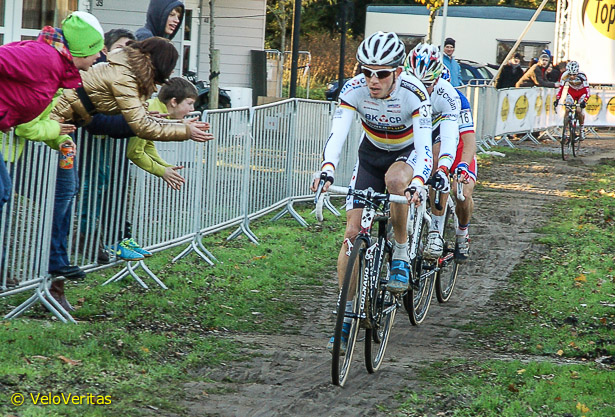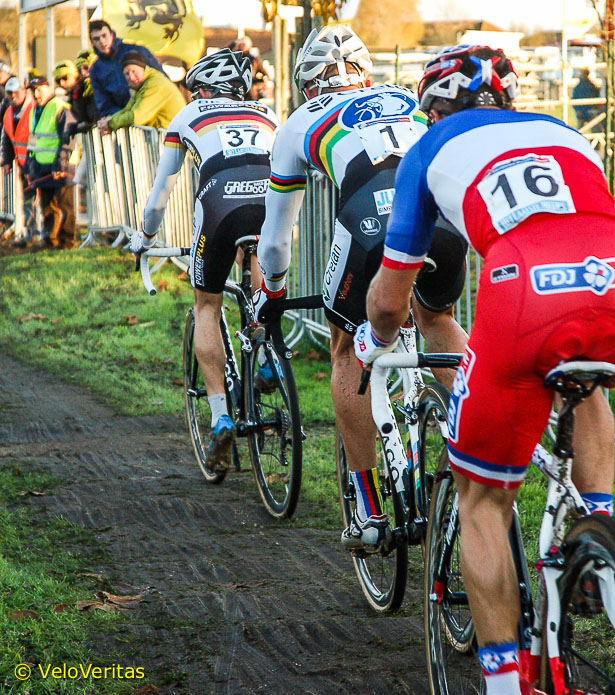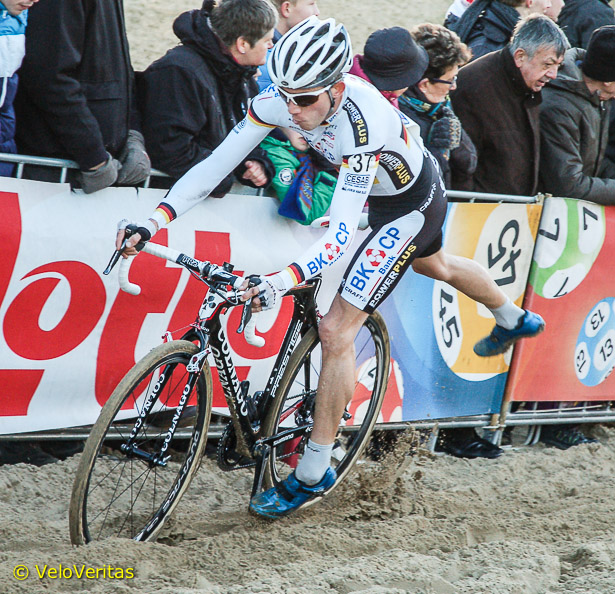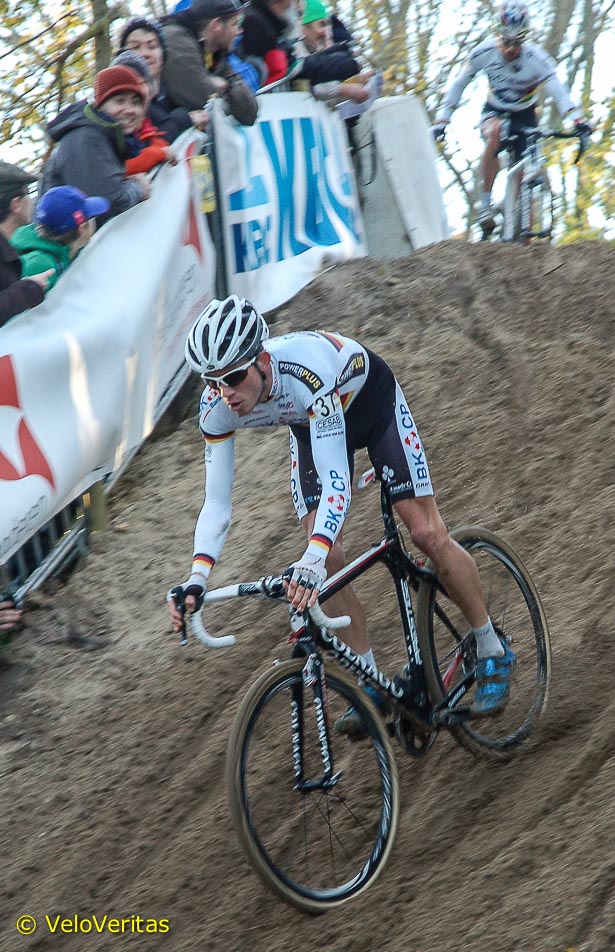Cyclocross at the highest levels is dominated by the Belgians – albeit ‘young Vans’ der Haar and der Poel are forging the orange of The Netherlands back into the limelight.
But it’s been a while since we’ve had a German ‘up there’ in the big races.
It’s 21 years since mountain biker turned crosser Mike Kluge took a rainbow jersey for the Fatherland and 20 years have passed since a German made the Elite podium – again with Kluge.
But there’s a man from Berlin who’s creeping up the rankings and has to be viewed as a podium possible for the 2014 Worlds in Hoogerheide – 26 year-old Philipp Walsleben (BKCP-Powerplus.)
It was in 2003 he took silver in the German debutants’ cyclocross championship and within two years he was national junior champion.
There was a raft of wins in his homeland in 2006 with the national U23 title coming his way as well as second place in the European Cyclocross Championships one year later.
In 2008 he made the European title his own and one year later swapped the blue of a European champion’s jersey for the beautiful rainbow bands of World U23 Champion to add to his German national U23 champion’s jersey.
In 2010 there was an elite national champion’s jersey and another in 2011 and a host of wins across Europe.
He surrendered his national title to Christoph Pfingsten in 2012 but grabbed it back this season before enjoying an excellent road season with a stage and the GC in the Baltic Chain stage race and a stage and third on GC in the Tour of Alsace.
This winter has seen him consistently on the podium in the World Cups, rubbing shoulders with the very best – Nys, Albert, Van Der Haar and all the rest.
Philipp took time out from the hectic Xmas/New Year ‘cross frenzy’ to talk to VeloVeritas.

What’s it like being a German on a Belgian team, Philipp?
“I think the question really is; ‘how does a German come to be on a Belgian team?’
“And the answer is that if you want to be a successful cyclocross rider then the only place it’s possible to be based is Belgium.
“As far as being a foreigner on a Belgian team it’s not so bad; we don’t get the same pressure that the home riders do – the Media and fans are tough on them.
“I live in Belgium from September through to February in a little place near Leuven, my home in Germany is near Berlin.”
You’ve been very consistent at a high level all this season – much better than 2012.
“Physically I’m better than last year and I’ve had a good summer on the road.
“I had some good performances in 2012 but I had bad luck too in the first two World Cups – and some poor start seeds which affected the morale.
“I did lose self belief a little; but this year my body and mind are good, the bike is good and luck has been with me – it’s all come together.”
You had an excellent road season, winning the Baltic Chain overall and third in the Tour of Alsace.
“That was a sign of my feeling better – and I really like to ride on the road.
“The good thing about being a ‘cross rider on the road is that there’s not a lot of pressure on you.
“If you do well then that’s great, but if you don’t, everyone knows you’re only riding to prepare for the ‘cross season.”

Would you say it’s essential to have a solid road programme over the summer to be a top ‘cross rider?
“It’s not essential for everyone; look at Nys, he doesn’t do the road so much – he trains a lot and rides mountain bike races.
“But for me it is essential, I have to stay busy and motivated over the summer; it’s a long time from April through to the start of the season in September – the road season gives you goals to aim for along the way.”
Tell us a little about your training.
“In the summer it’s all on the road but from September I’ll run once each week and do technical and specific training – once the season starts we’re racing at least twice each week.
“Your road work gives you endurance but for ‘cross you have to do short intervals, you have to train to be explosive; you don’t want to turn into a diesel – that’s no good for cyclocross, it’s all about speed.”
When do you get a rest?
“That’s a good question!
“We have three weeks off after the ‘cross season in March with another week off in the summer, usually just after the European national road championships.”
Winning the U23 Worlds in 2009, how did it change your life?
“That was the point where I realised that I had to stick with the sport, that I was good at it, it was my discipline and could make a success of it in the future.
“Even now I look back to that day if my confidence is low to remind myself that I have to keep trying because I am a good rider.”

Hoogerheide is where you won that title and where the Worlds are this season.
“I know the character of the course well; but they change the parcours every year and it’s a course where the weather is a big factor – but for sure it’s a place where I have happy memories.”
What are your favourite parcours?
“I like it a little bit muddy but not so much that there’s a lot of running.
“Rain two hours before the race is perfect for me – but not during the race because that way you get cold.
“I suppose you’d say – muddy, technical and hard is how I like it.”
Stybar is back and winning – a surprise?
“No, not a surprise, he’s a good rider but not as good as he was and I don’t know if he can win at the top level, again.
“He’s a good rider, a fighter and a real talent – but it’s difficult for him on a programme of just six races; we’ve ridden 20, already.”
How important is the German title to you?
“I’d won the title five times, once as a junior, twice as a U23 then twice as Elite and then in 2012 Christoph Pfingsten beat me into second and I realised that I really like wearing that jersey, a lot!
“It helps with the start money – but it’s important for your morale to wear the champion’s jersey of any country.”
How big is ‘cross in Germany?
“Not so big, nothing like Belgium.
“In Germany when people ask me about the sport I do, I have explain to them about it; ‘one hour on a circuit over laps, cross country . . . most people have never heard of it.
“You need home talent for people to get interested.”

Is the German media still ‘anti’ on cycling?
“I think they’re still scared to report on it – they’re frightened to get their fingers burned, again.
“One of the sponsors of Telekom was a German TV channel and now they see that some of their money went to buy drugs.
“If German riders continue to get good results then it’ll change…”
A tech question – disc brakes?
“I’ve tried them, in fact one of my bikes has them – but if it’s a course where I have to change bikes then I can’t use it because you’d be using two types of brake in the same race and that’s not practical.
“I’m not convinced they give a big advantage because you don’t brake that hard in a cyclocross – traction is the most important thing, where your rubber meets the mud.
“And at the end of the day it’s the rider’s body is where most comes from – not your brakes!”
And your biggest goal in cycling?
“That’s a difficult question and it won’t be easy; but I think that one day it is possible that I could be world champion – but it’ll be difficult!”



